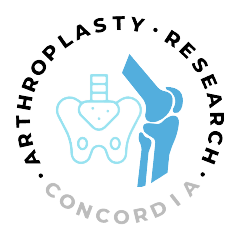Concordia’s Research Legacy
Our Orthopaedic Research program began in 2003 and has thrived over the past 20 years, achieving meaningful goals and milestones. Thanks to donations from our community, we constructed the Hip and Knee Institute in 2009 to house our world-class research program, creating a centre of capability and expertise that is unmatched elsewhere in the world.
Over the past 20 years, our research has stretched from the benchtop to the bedside and beyond.
On the benchtop, our engineering staff and machines have evaluated dozens of joint replacement devices for quality and safety before being used in the clinic.
At the bedside, our clinical staff and systems have monitored patient well-being and joint replacement success through innovative, proven means. Chasing what’s next, our scientific staff and equipment have assessed joint replacement failures, pinpointing the root cause for future devices to learn from and avoid.
The Concordia Hip and Knee Institute and the Orthopaedic Research program were built by Manitobans to be like no other.
In 2021 we founded the Arthroplasty Research Chair with a number of sustainable grants and donations that have allowed move quickly on a number of projects that will expand our reach.
Impact of Research
This research will directly impact those suffering from arthritis and other musculoskeletal diseases within the catchment area of Concordia’s orthopaedic program; all of Manitoba, Nunavut, eastern Saskatchewan, and western Ontario.
The majority of the 2000+ joint replacement patients cared for each year at Concordia Hospital are 55-80 years of age, but can extend to patients as young as 16 and as old as 105.
We anticipate the greatest benefit will be to our younger patient population (45-65 years) who are generally active individuals with many important functional needs to be met such as work, family, exercise, sport and leisure.
Our older patient population will also receive benefit through a rapid return to function and pain-free mobility, allowing them to be active in the community and economy through part-time work, volunteering, philanthropy, and travel/tourism within Manitoba.
This research will also impact the world through publications in top-tier international medical journals which drive best practices for care.
The Concordia Joint Replacement Group has had a long history of research which has resulted in direct, tangible benefit to our patients:
- Province-wide reduction in revision (“re-do”) surgeries from 3-4% to 1-2% within 6 years
- Selecting to use joint replacement technologies with sound scientific data and proven clinical track record to give patients their one-joint-for-life
- Improving hip replacement surgery, operating room efficiency, and post-operative care to achieve same-day surgery with no overnight hospital stay
- Trialing new, innovative joint replacement devices and materials in small, closely monitored research studies using world-leading assessment technologies
- Development of new surgical techniques and customized devices for complex surgeries to deliver greater patient benefit
Future Research
The focus of the Arthroplasty Research Chair will be to continue along these same pathways through the following projects:
- Impact, access to care, and key issues of joint replacement on our Indigenous population;
- Advancing identification, treatment of, and patient outcomes following a joint replacement related infection;
- Improving knee replacement function by comparing surgical techniques, exploring new devices and materials, and enhancing surgical precision through robotics;
- Reducing surgical wait list and healthcare costs by furthering operating room efficiency, surgical techniques, and post-operative medications and monitoring;
- Ensuring the safety and effectiveness of new and novel joint replacement devices with high-precision assessment methods and innovative clinical research methods.
Concordia Arthroplasty Research Chair funds will be used for operating costs associated with the research projects outlined by the Chair’s research directive.
Such investments will include; research and engineering staff, project supplies and consumables, laboratory usage, equipment maintenance and modification, new equipment purchases, costs associated with publishing and presenting the work (delivering local and international impact).
Research managed by the Arthroplasty Research Chair will improve operating room efficiencies, reduce barriers to access, and accelerate innovative approaches to healing the growing number of Manitobans living with debilitating hip and knee pain.
- Dr. Turgeon and Concordia’s hip and knee researchers have investigated why some hip and knee implants fail — research that can lead to new designs, manufacturing processes and surgical techniques that result in more comfortable, longer-lasting implants.
- They have also been studying the benefits of bilateral surgeries, where a person with two damaged knees has them both operated on simultaneously.
- Soon, the Chair and their team of researchers hope to launch a pilot study to understand how socioeconomic status impacts access to care.
- Beyond that, there is a whole world of surgical robots to explore: mechanical assistants that may improve surgical outcomes thanks to their incredible precision.
